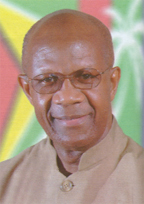The National Assembly yesterday voted to update laws to curb the widespread theft in the electricity sector and opposition speakers called on the administration to tackle poverty and other social issues which they say are fuelling the problem.

The Electricity Sector Reform (Amendment) Bill empowers the Guyana Power and Light Company (GPL) among other public suppliers to refuse service to persons convicted on multiple offences under the Act. The new law also largely sets out harsher penalties for persons caught in the act(s), among its other provisions.
Prime Minister Samuel Hinds said the “big stick” measure is the approach being pursued now because various other methods have failed, including attempts to educate the public against electricity theft. Public perception in some parts, he said, is that electricity should be supplied as a right, but according to him a heavy cost is attached to its supply. “It is not our desire to fine people, put them in jail or imprison them…” he noted.
Hinds also emphasized that government was reluctant to criminalise citizens over electricity theft. He said the aim of the legislation is to bring an end to widespread electricity theft among both residential and commercial consumers. He noted that it also targets persons working in the sector who are involved in corrupt transactions; they will now face twice the fine and twice the period of imprisonment if convicted.

One of the tougher penalties in the amended legislation states that every person over the age of 18 years occupying a home where any act considered illegal under the legislation is perpetrated would be considered culpable. The fines attached to the offences have also been raised and there is mandatory imprisonment for residential offenders who are convicted on three occasions; the fines have also increased for commercial offenders.
Opposition speakers disagreed with the new approach, saying government needs to address unemployment and poverty among other issues rather than criminalise families that steal electricity. AFC MP Shelia Holder said desperation has pushed many Guyanese to electricity theft and according to her sometimes the choice involves whether to leave young children in the dark because electricity is not affordable.
Holder said that it is the government’s inability to deal with poverty and economic development which has resulted in the problem. “It’s a dilemma for many,” she said, adding that many persons also put their lives at risk when they steal electricity. She said the administration needs to channel revenues into the vulnerable sectors of society.

PNCR-1G MP Lance Carberry dismissed the legislation as being too occupied with the theft of electricity rather than solutions to improve the sector and make electricity more affordable for Guyanese. He questioned when an efficient, reliable and stable service would be provided, noting that self-generation has also increased over the years.
Carberry said the Guyanese public bears the burden of the sector’s inability to offer a more affordable and reliable service, noting that many paying consumers are also suffering because of the theft. He said the power company’s energy conservation campaign has failed to have any impact because people are not seeing the benefits of their efforts. According to him, there needs to be a programme to show how the public is benefiting consistently from conservation efforts.
Carberry declared that he has embarked on a conservation programme at home and he read his own consumption charges over a period to the Assembly to show the lack of consistency in the service charges. Hinds agreed that there were fluctuations with Carberry’s bills over the period disclosed but he countered that the problem could have resulted from incorrect meter reading in some instances. “You can always get a pre-paid meter,” Hinds said, triggering a burst of laughter in the House.
Hinds argued that the power supply in the country has improved and he noted that the supply would be enhanced in the future when the Amaila Falls Hydro Project comes on stream.
PPP/C MP Manzoor Nadir also spoke on the bill and he said that the legislation is necessary because commercial losses as a result of electricity theft amount to some $3B annually. He said too that the administration has made progress in the sector and argued that things are better now than in previous years.
The controversial section of the legislation is contained in section 60, which was re-enacted in the new legislation after the original section of the Principal Act was repealed. The new bill sets out heavy penalties for waste, theft, diversion, consumption or other illegal use of electricity; meter tampering; illegal reconnection of a supply; and aiding and abetting, among other offences cited. The range of criminal offences under the bill is also clearly set out.
Currently, public suppliers include GPL, Linden Elec-tricity Company Inc., Kwak-wani Utilities Inc. and Lethem Power Company Inc. The administration is also considering putting in a small grid in Mahdia and Port Kaituma.





